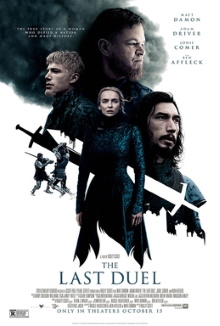This film by Ridley Scott features a triptych structure to tell its story from the perspectives of its three main characters. That instantly earns comparisons with Akira Kurosawa’s Rashomon. Unfortunately this film is simply unworthy of the comparison as the treble format here is an unnecessary indulgence that detracts from the film instead of enriching it. The film is technically well made and the duel at its center is one of the most brutal and realistic ones I’ve ever seen. But it is confused about where its emotional and dramatic heart is and really only needs one point of view.
Jean de Carrouges and Jacques Le Gris are squires under the same liege lord Count Pierre d’Alençon and become friends while fighting together. However the Count dislikes the dour and illiterate de Carrouges and after Le Gris turns out to be well educated engages him to be his right-hand man. To repair his finances, de Carrouges agrees to marry Marguerite de Thibouville, whose father is considered a traitor to the king, in exchange for a sizable dowry. But when de Thibouville is unable to afford his taxes, the Count takes the prized piece of land that was to be part of the dowry and gifts it to Le Gris instead. This plus subsequent conflicts turn the two former friends into rivals. When Le Gris finally gets a chance to meet Marguerite, he is instantly smitten by her especially when he hears that she too is educated and well-read. One day upon returning from a campaign in Scotland for which he is knighted, de Carrouges hears from his wife that Le Gris barged into his home while he was gone and raped her. This sets the stage for the fateful duel to the death between de Carrouges and Le Gris.
The film is divided into three parts, one for each of the main characters. However unlike Rashomon, the three accounts don’t really contradict each other. Each perspective simply adds information unknown to the others, so that while de Carrouges believes that he saved Le Gris’ life in battle, Le Gris was also the one to send soldiers to support his friend after he charged in by himself recklessly. This also means that some key events are repeated and there is zero ambiguity about what really happened. This seems to miss the point of Rashomon and makes the treble perspective superfluous. What’s worse is that while there may be some subtler dramatic interplay in how Le Gris keeps speaking up for de Carrouges in private but the latter isn’t aware of it and thinks the former is deliberately undermining him at every turn, none of that matters once the rape happens. As we see from Marguerite’s perspective, the rape really happened and she, as women generally are, is the ultimate victim of the ego games between men. The rape is the singularity upon which the entire film turns and its inexorable weight simply erases the significance of everything else that has happened beforehand. We end up feeling that the plight of the women of the era is the real tragedy of the film and we should have been following Marguerite’s point of view all along.
As usual, Scott is technically proficient and naturally the film looks great. The titular duel is everything one could hope it to be, starting with horseback jousting and ending with scrambling in the dirt with whatever weapons their hands can snatch up. I really love the way it demonstrates how tough armor is and how knights rely on it as part of their fighting style. The medieval world looks realistic too and it’s particularly striking how Paris looks when it’s still basically an oversized village. On the other hand, I don’t get the sense that this properly takes place in France and that everyone is French. I get that this is an English-language film and it would be silly to have everyone speak in fake French accents, But I feel that it could still do more to create an illusion of this being France. I’d attribute this deficiency to the script especially with Ben Affleck and Matt Damon being both involved in writing it and seeming to treat this as their personal project with a really cool structure.
Overall I’d say this is something of a mixed bag. The fight scene is iconic enough to stand on its own and will likely live on as a widely shared clip apart from the rest of the film. It also works well as a brutal demonstration of how little power women of the era have over their own lives. At the same time this is also a film that is thoroughly confused over what it’s about and what its strongest themes are. With de Carrouges being such a brute of a character, his portion of it is actually boring despite being action packed. This further cements the impression that the filmmakers had competing and not always coherent visions of where this should go.
